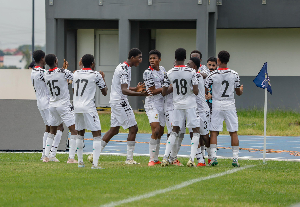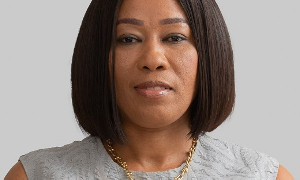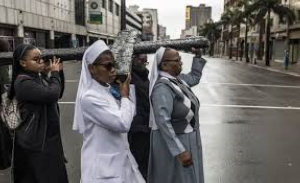The Media Network on Migration (MENOM) Foundation has schooled the people of Dzodze, a town near the Akanu border in the Volta Region on the requirements, rights and responsibilities of migrants.
The exercise was part of activities of MENOM to enlighten them on the Economic Community of West African States (ECOWAS) Free Movement Protocol.
ECOWAS adopted the Protocol in 1979 in recognition of intra-regional mobility to promote economic development in both migrant-receiving and sending areas.
The sensitisation formed part of MADE West Africa Project with the aim of ensuring the effective implementation of the ECOWAS Free Movement Protocol in Ghana and Sierra Leone.
MENOM Foundation is implementing the project in collaboration with the Centre for Migration Studies of the University of Ghana with funding from the European Union.
Mrs Patience Gbeze, the Project Director of MENOM Foundation, a Non-governmental Organisation, said the Foundation as part of the project had organised a workshop for selected journalists and key stakeholders on the ECOWAS Card and the requirements of citizens.
"We also organized two sensitization programmes at Aflao and Akanu and its environs on the effective implementation of the Protocol and today's meeting is the fourth in a series to create awareness on the Protocol as well as the responsibilities of migrants," she added.
She urged the community to maintain vigilance and observe safe migration process to avoid harassment and extortions at the country's borders.
She also advised them to acquire valid documents from mandated officials but not from middlemen popularly known as 'Goro boys’.
She said it was important for everyone to get more and accurate information about the destination countries or towns they are travelling to and also use the approved routes to avoid leaving them stranded or in danger.
Mrs Gbeze said the Free Movement Protocol did not just mean that citizens of the ECOWAS member states could just pack bags and luggage and start moving across borders.
Those who desired to travel must possess all the needed documentation, which included; the ECOWAS Identification Card, Passport, resistant permit, and Vaccination cards, among others.
She said once citizens from any member state possessed the needed documentation, the Border Officers did not have the right to harass them or extort money from them as they travelled across the borders.
She said MENOM Foundation in the future would establish Migration Clubs in selected basic schools within the country’s border communities to enhance their knowledge on migration-related issues and migrants' rights.
Mr Richard Ameyedo, the Ketu North Municipal Director of the Information Service Department urged those who desire to migrate to desired countries to register with the respective embassies for due recognition and assistance.
He commended MENOM Foundation for embarking on such an extensive education campaign to safeguard the implementation of the ECOWAS Free Movement Protocol towards reaping the benefits there were for Ghanaians and ECOWAS Citizens.
Mr Emmanuel Domie, Ketu South Municipal Director of the Information Services Department urged the townsfolk to acquire the needed documentation and determine to observe the rights and responsibilities stated in the ECOWAS Free Movement Protocol.
He reiterated the importance and benefits of migration to both the community and the country at large as it brought in remittances to families and provided jobs for the migrants and reiterated the need to use the right channels when seeking to travel.
Madam Cecilia Yawa Tagborlo, the Assembly Member for Dzodze-Afeyime Electoral Area of the Ketu North Municipal commended MENOM for enlightening the community on such an important regional issue.
She, however, raised concerns that although the protocol was being implemented, there were still some levels of extortion at the borders and urged the government to work together with the ECOWAS Commission to take action at reducing the extortions at the borders.
MENOM Foundation was established in 2014 by a group of journalists with a special interest in migration-related issues and has since been writing on such issues to inform the public about the rights of migrants, the dangers involved in illegal migration, economic benefits of inter and intra mobility, among others.
General News of Thursday, 5 March 2020
Source: GNA













